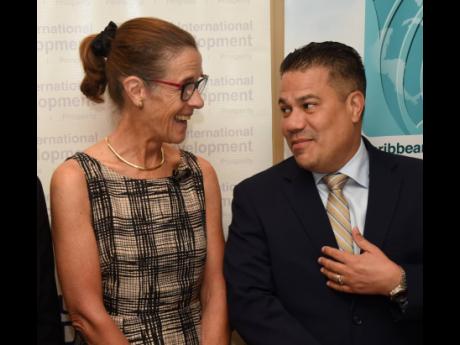SIDAR Programme launched for Caribbean countries
Funding for climate-change resilience in the Caribbean has been bolstered by the Small Island Developing States Capacity and Resilience (SIDAR) Programme, a £2.7 million (approximately J$535 million) initiative that is being funded by the United Kingdom (UK).
The programme will be implemented by the Caribbean Community Climate Change Centre (5Cs) with seven member states of CARICOM – Belize, Dominica, Grenada, Jamaica, St Lucia, St Vincent and the Grenadines, and Suriname – poised to benefit.
Speaking at the launch in Kingston this week, executive director of the 5Cs, Dr Colin Young, noted that accessing climate finance for small island developing states (SIDS) can be difficult, an issue that SIDAR will address.
“The existing financial architecture is not meeting the unique needs of our small island developing states like those of us in the Caribbean. Despite the stated intention of these funds that climate -finance flows should flow to the most vulnerable, we know that it is not flowing at the scale and speed required,” he said.
He noted that to date, SIDS have only received 10 per cent of the $14 billion allocated resources from the Green Climate Fund (GCF). And of the 224 projects funded by the GCF to date, only 29 SIDS projects have been approved.
The GCF is the world’s largest climate fund, established within the framework of the United Nations Framework Convention on Climate Change to accelerate transformative climate action in developing countries.
Pointing to an International Monetary Fund 2023 report, Young highlighted that the Caribbean received only $800 million from the GCF, the Global Environment Facility GEF, and the Adaptation Fund combined.
Even though the region requires an adaptation investment of US$100 billion as it is one of the regions of the world most vulnerable to the impact of climate change.
Young noted that even as the region receives a “trickle of climate finance”, its structural and capacity constraints also impact access, absorption, and delivery of climate finance to execute approved projects.
BANKABLE PROJECTS
It is a concern shared by Senator Matthew Samuda, minister in the Ministry of Economic Growth and Job Creation with responsibility for climate change, who contends that while there are structural deficiencies with the global climate finance funds, the region’s project development capacity has not allowed it to engage these entities in the most productive ways, “and we don’t get the luxury of writing the rules”, he noted.
The minister, however, underscored Jamaica’s support for SIDAR. “You will have the committed support and the action behind it to ensure that these projects are successfully deployed because we are in the race against time,” he said.
Young, in the meantime, has lauded SIDAR as “innovative”, noting that not only will it reduce the barriers to accessing climate finance in the Caribbean, it will also increase the scale, speed, and flow of climate finance to Caribbean countries by enabling the development of bankable projects and programmes. It will also build capacity in Caribbean countries to address access, absorption, and delivery of climate-finance issues.
He shared that the programme would fund seven project-development specialists and seven project-development officers in the seven Caribbean countries with the specific objective of assisting these countries to mobilise climate finance, particularly in the project-preparation grants and readiness projects.
“For the 5Cs, this is actually a historic achievement as it is the first time that the 5Cs (or any other Caribbean institution for that matter with the support of SIDAR) is actually embedding technical capacity within member states to specifically assist our countries in mobilising climate finance,” he said.
Meanwhile, British High Commissioner to Jamaica Judith Slater stated that the programme is a representation of the UK’s commitment to SIDS and a fulfilment of its promise to support them in accessing climate finance at COP26.
“We all know the frustrations in accessing border-development finance, and we know that current access arrangement remains slow and uncertain, resource intensive, and not always aligned with partner countries’ own national priorities,” she said.
“As the UK, we’d like to see greater levels of predictable, flexibility, transparency, and speed of access, but also to focus support of SIDS’ priorities and plans. So we’re using every opportunity we can to nudge changes in the way the global system functions so that SIDS find it easier to navigate funding options,” she continued.

